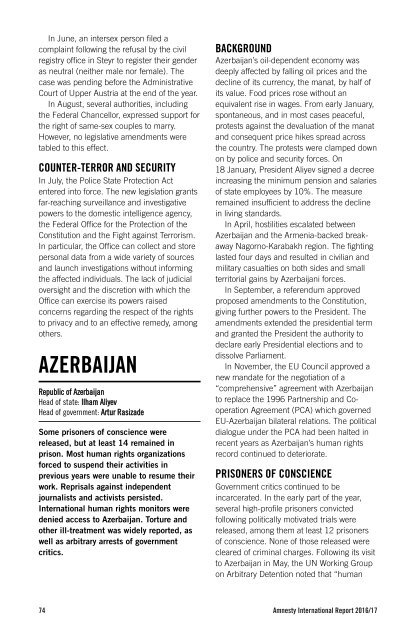AMNESTY INTERNATIONAL REPORT 2016/17
2lEHU9j
2lEHU9j
You also want an ePaper? Increase the reach of your titles
YUMPU automatically turns print PDFs into web optimized ePapers that Google loves.
In June, an intersex person filed a<br />
complaint following the refusal by the civil<br />
registry office in Steyr to register their gender<br />
as neutral (neither male nor female). The<br />
case was pending before the Administrative<br />
Court of Upper Austria at the end of the year.<br />
In August, several authorities, including<br />
the Federal Chancellor, expressed support for<br />
the right of same-sex couples to marry.<br />
However, no legislative amendments were<br />
tabled to this effect.<br />
COUNTER-TERROR AND SECURITY<br />
In July, the Police State Protection Act<br />
entered into force. The new legislation grants<br />
far-reaching surveillance and investigative<br />
powers to the domestic intelligence agency,<br />
the Federal Office for the Protection of the<br />
Constitution and the Fight against Terrorism.<br />
In particular, the Office can collect and store<br />
personal data from a wide variety of sources<br />
and launch investigations without informing<br />
the affected individuals. The lack of judicial<br />
oversight and the discretion with which the<br />
Office can exercise its powers raised<br />
concerns regarding the respect of the rights<br />
to privacy and to an effective remedy, among<br />
others.<br />
AZERBAIJAN<br />
Republic of Azerbaijan<br />
Head of state: Ilham Aliyev<br />
Head of government: Artur Rasizade<br />
Some prisoners of conscience were<br />
released, but at least 14 remained in<br />
prison. Most human rights organizations<br />
forced to suspend their activities in<br />
previous years were unable to resume their<br />
work. Reprisals against independent<br />
journalists and activists persisted.<br />
International human rights monitors were<br />
denied access to Azerbaijan. Torture and<br />
other ill-treatment was widely reported, as<br />
well as arbitrary arrests of government<br />
critics.<br />
BACKGROUND<br />
Azerbaijan’s oil-dependent economy was<br />
deeply affected by falling oil prices and the<br />
decline of its currency, the manat, by half of<br />
its value. Food prices rose without an<br />
equivalent rise in wages. From early January,<br />
spontaneous, and in most cases peaceful,<br />
protests against the devaluation of the manat<br />
and consequent price hikes spread across<br />
the country. The protests were clamped down<br />
on by police and security forces. On<br />
18 January, President Aliyev signed a decree<br />
increasing the minimum pension and salaries<br />
of state employees by 10%. The measure<br />
remained insufficient to address the decline<br />
in living standards.<br />
In April, hostilities escalated between<br />
Azerbaijan and the Armenia-backed breakaway<br />
Nagorno-Karabakh region. The fighting<br />
lasted four days and resulted in civilian and<br />
military casualties on both sides and small<br />
territorial gains by Azerbaijani forces.<br />
In September, a referendum approved<br />
proposed amendments to the Constitution,<br />
giving further powers to the President. The<br />
amendments extended the presidential term<br />
and granted the President the authority to<br />
declare early Presidential elections and to<br />
dissolve Parliament.<br />
In November, the EU Council approved a<br />
new mandate for the negotiation of a<br />
“comprehensive” agreement with Azerbaijan<br />
to replace the 1996 Partnership and Cooperation<br />
Agreement (PCA) which governed<br />
EU-Azerbaijan bilateral relations. The political<br />
dialogue under the PCA had been halted in<br />
recent years as Azerbaijan’s human rights<br />
record continued to deteriorate.<br />
PRISONERS OF CONSCIENCE<br />
Government critics continued to be<br />
incarcerated. In the early part of the year,<br />
several high-profile prisoners convicted<br />
following politically motivated trials were<br />
released, among them at least 12 prisoners<br />
of conscience. None of those released were<br />
cleared of criminal charges. Following its visit<br />
to Azerbaijan in May, the UN Working Group<br />
on Arbitrary Detention noted that “human<br />
74 Amnesty International Report <strong>2016</strong>/<strong>17</strong>


